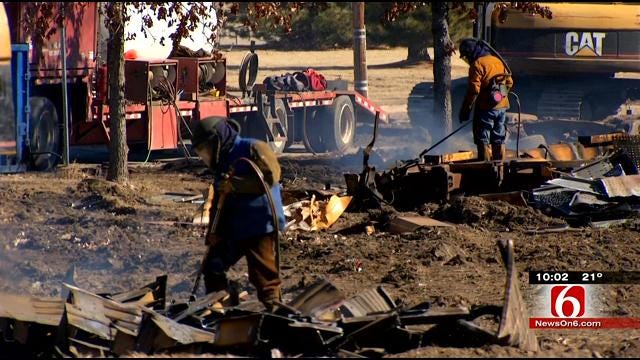Potentially Explosive Train Cargo Puts Tulsans At Risk
They're a moving threat, crisscrossing Green Country every hour of every day, and there's a warning about the explosive potential of rail cars traveling through Oklahoma.Tuesday, February 11th 2014, 9:45 pm
They're a moving threat, crisscrossing Green Country every hour of every day, and there's a warning about the explosive potential of rail cars traveling through Oklahoma.
Recent derailments and deadly explosions have put rail transport of crude oil under scrutiny.
In Canada, a train carrying oil from North Dakota's booming oil patch derailed last July, causing explosions that killed 47 people.
Now the Department of Transportation has issued a warning about that specific type of oil, advising it's more flammable than traditional oil.
Read The U.S. Department Of Transportation's Warning About Bakken Oil
The feds are scrambling to increase regulations on the transportation of crude oil by rail; trying to make it safer. But our investigation revealed we are all at risk if a train derails.
And that oil is just one of many explosive materials traveling through our cities and towns every single day.
Jim Tinnin lives along the railroad in North Tulsa, right where several train cars derailed in December, leaving a mess crews are still cleaning up.
"It's a concern alright. You know, but I guess you kind of try to live with it," said Tinnin.
According to new warnings from federal government agencies, perhaps Tinnin and the rest of us should be worried.
The warnings come in the wake of deadly train explosions, and conclude that the millions of barrels of crude oil being shipped out of North Dakota and Montana's Bakken oil fields each day are more flammable than traditional oil.
Burlington Northern Santa Fe's trains haul most of the Bakken oil to refineries around the country.
I asked the railroad if that oil comes through Tulsa, but BNSF wouldn't tell say, citing homeland security laws following September 11.
A spokesman for the rail company said, "BNSF shares information about the hazardous materials moving through a community with local emergency responders for safety reasons, but does not make that information public for security reasons."
Tulsa's first responders are Hazmat firefighters.
Hazmat Coordinator, Paul Ator, said the railroads only tell them what's in their tankers after there's been an incident, like a leak or a derailment.
"There's really not that much communication as to what's coming in and out of town," said Ator.
There are other ways to find out if Bakken crude oil is coming through Tulsa.
We combed through newsletters and annual reports of oil and gas and railroad companies. They show thousands of barrels of Bakken crude oil coming through Tulsa every day.
Rail tankers bring it through Tulsa, then some of it continues on the railroad to Stroud where it is put in a pipeline to Cushing and, ultimately, to refineries along the gulf.
In fact, I found out the train involved in a derailment and explosion in Luther, Oklahoma, in 2008 was carrying Bakken crude to the gulf.
It came through Tulsa before derailing just two miles from the center of Luther, triggering evacuations, but no injuries.
In Tulsa, the tankers pass right by city hall, busy downtown office buildings and the BOK Center.
View Map Of Railroads In Oklahoma
"So if there was a fire involved they would immediately isolate a half a mile in all directions," said Ator.
He said when it comes to trains carrying crude oil from the Bakken, until he's told otherwise, he'll treat them like any other crude oil tankers.
If crude oil spills, the U.S. Department of Transportation's Emergency Response Guidebook calls for an evacuation of at least 1,000 feet, and if it's on fire, evacuations of at least half a mile in all directions.
Ator can tell what's on every train car that's marked with a placard, "That's going to be hexane and that's going to be flammable," said Ator, pointing to a tanker parked in BNSF's Cherokee rail yard in west Tulsa.
Ator said he worries more about other chemicals coming through Tulsa.
"It could be oil. It could be diesel, gasoline, propane, anhydrous ammonia, carbon dioxide... just all kinds of stuff in these things," said Ator.
He said his team is trained and ready to respond to rail spills, derailments, fires and explosions; and Oklahoma has seen its share. More than 60 incidents involving the release of hazardous materials from trains in our state were reported to the feds in the last ten years, 25 of them labeled, "serious."
A 2011 derailment in West Tulsa involving ten rail cars carrying anhydrous ammonia is one of the most alarming.
Anhydrous ammonia is what blew up in last year's deadly west Texas fertilizer plant explosion.
There wasn't a single leak with the west Tulsa derailment, but it could have been a huge disaster.
"We've been very fortunate," said Ator.
Among the reforms the feds are considering in their efforts to make crude transportation safer: phasing out the most common type of tank car that carries hazardous materials on trains; the DOT 111 which basically, they said, is no longer safe and can be found in all of our rail yards.
They're also considering re-routing hazardous shipments to avoid urban areas, though many said that's just not realistic.
More Like This
February 11th, 2014
November 13th, 2024
October 28th, 2024
October 17th, 2024
Top Headlines
January 7th, 2025
January 7th, 2025
January 7th, 2025












